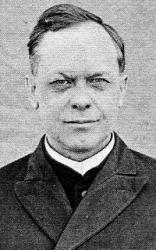Planning worship?
Check out our sister site, ZeteoSearch.org,
for 20+ additional resources related to your search.
- |
User Links
Person Results
C. W. Naylor

1874 - 1950 Person Name: Charles W. Naylor Author of "To Know That He Knows" in Timeless Truths Naylor, Charles Wesley. (1874--1950). C. W. Naylor was born in southern Ohio and reared in Ohio and West Virginia by grandparents. At the age of nineteen he left the Methodist church for the Church of God. He worked for a while at the Gospel Trumpet Company in Grand Junction, Michigan and on some evangelistic tours. He was ordained in 1899 in Springfield, Ohio. He was first injured in 1908 in Florida while moving timbers from under a meeting tent. He suffered a dislocated kidney and other internal injuries. A year later he was in a bus accident that left him an invalid for the rest of his life.
Naylor wrote eight books, many articles and pamphlets, many hymns and gospel songs, besides being a columnist in the Gospel Trumpet.
--John W.V. Smith, DNAH Archives
See also: Neidert, David L. (1985). Reformation's Song: A History of Church of God Music. Anderson, Ind.: the author.
C. W. Naylor
Barney Elliott Warren

1867 - 1951 Person Name: Barney E. Warren Composer of "[When my soul is oppressed with the sorrows of life]" in Timeless Truths Barney Elliott Warren was an American Christian hymnwriter and minister.
See more in Wikipedia
Barney Elliott Warren
Clara McAlister Brooks
1882 - 1980 Person Name: Clara M. Brooks Author of "To Know That He Knows" in Timeless Truths Birth: Oct. 9, 1882, Parke County, Indiana, USA
Death: Mar. 20, 1980, Tampa, Hillsborough County, Florida, USA
Clara McAlister Brooks was one of our early songwriters and four of her pieces are in the current hymnal. From the earliest days of the movement we have had women prominent in all forms of our ministry—missionaries, evangelists, teachers, pastors, and God has honored their sacrificial labors. For that reason we can stand in amazement when here, in the 1970s, such old-line denominations as the Episcopal church are being racked with controversy over whether the ordination of women is permissible. But before we gather Pharisaic robes about ourselves, perhaps we need to look candidly at the way in which we, too, succumbed to some of the cultural and prejudicial patterns of later decades!
--www.whwomenclergy.org/articles/
Clara McAlister Brooks


 My Starred Hymns
My Starred Hymns


